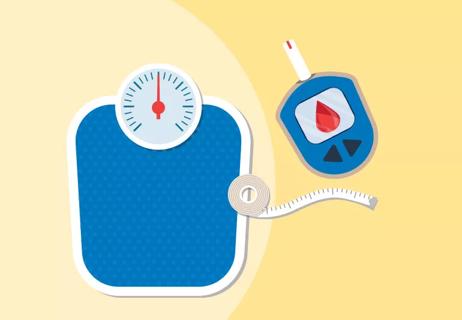What we often get wrong and how it can be managed

Mention the word “obesity,” and the opinions — and misconceptions — start flying. But obesity isn’t the result of a lack of willpower or not caring about appearance. Obesity is a condition that affects about 42% of the U.S. population.
Advertisement
Cleveland Clinic is a non-profit academic medical center. Advertising on our site helps support our mission. We do not endorse non-Cleveland Clinic products or services. Policy
Video content: This video is available to watch online.
View video online (https://cdnapisec.kaltura.com/p/2207941/sp/220794100/playManifest/entryId/1_12u39vkq/flavorId/1_5f3sgelj/format/url/protocol/https/a.mp4)
Obesity is a disease where an abnormal or excess accumulation of fat causes harm to one’s health.
Obesity is a disease where an abnormal or excess accumulation of fat causes harm to one’s health. So, what causes it and how can it be managed? Psychologist and weight management specialist Leslie Heinberg, PhD, MA, offers some helpful insight for navigating this complex disease.
“The most common misconception about obesity is that it is simply a ‘lifestyle’ disorder — that people have obesity simply because of their diet or physical activity. Obesity is very complex and is caused by a lot of factors,” explains Dr. Heinberg.
The American Medical Association (AMA) officially recognized obesity as a chronic disease back in 2013. The AMA also states that it’s a disease state with multiple functional changes that require a range of treatment and prevention options.
While obesity is considered a disease, there aren’t any true symptoms for it.
“Just like high blood pressure, obesity is ‘silent.’ It doesn’t have specific symptoms,” says Dr. Heinberg. “Obesity is defined by body mass index (BMI), which is a ratio of height and weight, but that’s a pretty blunt instrument. What’s more important is the percentage of fat mass to lean muscle mass and where people hold their weight (for example, abdominal obesity).”
Advertisement
The following factors can contribute to obesity.
If you’re eating a lot of calories but not burning more through physical activity, that can cause you to gain weight. Try to watch your portion sizes and start moving if you don’t already exercise regularly.
When you don’t have access to fresh food, it can be harder to make healthy choices. It’s also tough if you live in an area that doesn’t have nice parks, sidewalks or affordable fitness options. And believe it or not, ads for junk food could even be influencing how you eat.
Yes, they can affect how you gain weight. They can also increase your risk for obesity. Scientists have discovered that genes can cause obesity that occurs with conditions like Prader-Willi syndrome, which is a common genetic disorder that causes life-threatening obesity in kids. Variations in some genes may also contribute to obesity by causing you to feel hungrier so you eat more.
Hormonal conditions such as an underactive thyroid, Cushing’s syndrome and polycystic ovary syndrome (PCOS) can lead to obesity. Some medications can trigger it as well. They include corticosteroids (steroids), antidepressants and seizure medicines.
“More than 100 possible causes or risk factors for obesity have been identified. Some relate to our environment (for example, agricultural policies or how our neighborhoods are built) and there has been recent interest in the impact of our gut microbial community and how gut hormones play a role in driving our metabolism,” notes Dr. Heinberg.
Dr. Heinberg says there are a variety of treatment options for obesity. Lifestyle interventions that focus on changing a person’s diet and level of physical activity, while empowering them with behavioral tools and skills, can help increase success. Medical interventions are also beneficial.
“Several prescription medications are now available to help with weight loss and medically supervised diets can be helpful. Endoscopic and bariatric surgical procedures are associated with the greatest amount of weight loss but are reserved for more severe obesity or for those who are living with significant health problems,” says Dr. Heinberg.
As obesity is a multifactorial disease, if you’re living with it, your healthcare provider will also check for other medical conditions. Dr. Heinberg says that more than 220 conditions have been linked to obesity, including:
Living with obesity can make you more likely to develop Type 2 diabetes. Obesity also causes diabetes to progress much faster.
When your body fat increases, it can increase your risk for heart failure, coronary artery disease, atrial fibrillation or even sudden cardiac death.
Nonalcoholic fatty liver disease and nonalcoholic steatohepatitis have been linked to obesity. Obesity, combined with high blood sugar, insulin resistance and high levels of triglycerides and other fats in your blood, can cause fat to build up in your liver. This buildup can lead to inflammation or scar tissue in your liver as well.
Advertisement
While weight isn’t the only reason why people develop sleep apnea, extra weight can make it hard to breathe while sleeping. Fat deposits in your neck can block your upper airway. And excess fat around your midsection can make it harder for your lungs to work properly, or your lungs are more likely to collapse. And the risk for obstructive sleep apnea increases as your BMI goes up.
According to the National Cancer Institute, there’s evidence that higher levels of body fat can increase risks for certain cancers. These cancers include endometrial, liver, kidney, breast, ovarian and thyroid.
“People assume that once they’ve lost weight, they’re ‘done’ or that the obesity is ‘cured,’” notes Dr. Heinberg. “Unfortunately, after weight loss comes the much more difficult challenge of weight loss maintenance. Like many chronic diseases, obesity tends to recur and can worsen over time. Long-term treatment options are best for chronic diseases like this one.”
Dr. Heinberg says one of the best things that we can do is seek out healthcare providers who understand that obesity is a disease. “Find providers who understand that it isn’t an issue of willpower and take this condition seriously. No one should feel stigmatized in healthcare due to their weight.”
Advertisement

Sign up for our Health Essentials emails for expert guidance on nutrition, fitness, sleep, skin care and more.
Learn more about our editorial process.
Advertisement

Foods high in protein and fiber can help suppress your appetite, as can exercise, sleep and other healthy habits

This diabetes drug is quickly gaining attention for weight loss potential

They’re legit health conditions, and not entirely in your control

Your weight-loss plateau isn’t a question of willpower, it’s your body fighting back

And the one thing you can do to turn diabetes around

Science doesn’t support most claims about this bee byproduct, and supplements have potential risks

Maintaining a healthy weight, focusing on exercise and eating a well-balanced diet can improve your overall metabolic health

This diabetes medication can treat obesity, but it’s not for people who just want to drop a few pounds

Even small moments of time outdoors can help reduce stress, boost mood and restore a sense of calm

A correct prescription helps your eyes see clearly — but as natural changes occur, you may need stronger or different eyeglasses

Both are medical emergencies, but they are very distinct events with different causes